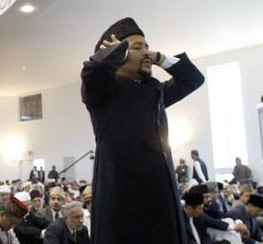Legislation of adhan and iqama
 Allah legislated the adhan [call to prayer] to inform the people that the time for prayer has begun, and to call them to pray while the iqama [call to commence prayer] is made so they stand up and arrange the rows in preparation for prayer.
Allah legislated the adhan [call to prayer] to inform the people that the time for prayer has begun, and to call them to pray while the iqama [call to commence prayer] is made so they stand up and arrange the rows in preparation for prayer.
During the time of the Prophet [pbuh] and his two Companions, Abu Bakr al-Siddiq and `Umar ibn al-Khattab (may Allah be pleased with them both), a single adhan and iqama were legislated for each prescribed prayer and the Friday prayer.
Time of legislation
The adhan was prescribed in the first year after the Prophet’s migration to Medina. This was reported by ‘Abdullah ibn Zayd and `Umar ibn al-Khattab who both testified to have seen the adhan in a dream. This was narrated by al-Tirmidhi, ibn Khuzayma and ibn Hibban who declared it authentic.
`Uthman ibn `Affan (may Allah be pleased with him) introduced the second call for the Friday prayer
When the number of Muslims increased during his reign, `Uthman found it necessary to add a second adhan to the Friday prayer. Because the adhan was legitimate to begin with, there was no harm in adding a second adhan to the Friday prayer at a time when the people needed it. In the same vein, Bilal (may Allah be pleased with him) offered a non-obligatory prayer after each ablution even though no supererogatory prayers were specifically legislated in its regard.
The Companions approved of Sayyidina `Uthman’s introduction of the second adhan
`Uthman (may Allah be pleased with him) did not deviate from the rest of the community when he introduced the second adhan for the Friday prayer. The Companions during his lifetime approved of it and, after him, the practice continued from the time of ‘Ali ibn Abu Talib’s caliphate until today.
Al-Sa`ib ibn Yazid (may Allah be pleased with him) said: “During the lifetime of the Prophet (peace and blessings be upon him), Abu Bakr and `Umar (may Allah be pleased with them), the adhan for Friday Prayer was called after the imam had taken his seat on the pulpit. But, when Muslims increased in number during the time of `Uthman (may Allah be pleased with him), he introduced a third adhan; it was called at al-Zawraa` [a place in the market of Medina]” [Reported by al-Bukhari]. Bukhari called this a third adhan because he referred to the iqama as the second adhan.
Al-Bukhari compiled another version of the hadith narrated by al-Zuhri who said: “I heard al-Sa`ib ibn Yazeed (may Allah be pleased with him) say, ‘During the lifetime of the Prophet (peace and blessings be upon him), Abu Bakr and Umar (may Allah be pleased with them both) the adhan for Friday prayer was called after the imam had taken his seat on the pulpit. But, when Muslims increased in number during the caliphate of `Uthman (may Allah be pleased with him), he ordered a third adhan to be made for the Friday prayer; it was called at al-Zawraa` and the practice was thus established.”
Scholarly opinion
Ibn Hajar al-‘Asqalani said in Fath al-Bari (2/394): “It is apparent that at that time, people in all countries followed the practice of `Uthman since he was a Caliph whose orders were to be obeyed … Everything that was not practiced at the time of the Prophet (peace and blessings be upon him) is considered bid’a [innovation] some of which are good and others are not. It is evident from what was mentioned earlier, that `Uthman added the second adhan to the Friday prayer to warn the people that its time had entered in analogy to the rest of the prayers, keeping its original adhan that was called when the imam took his seat on the pulpit. The purpose of adding the second adhan to the Friday prayer was inferred from the original aim of adhan (inform people that the time for prayer had entered) and it does not abrogate it.”
A Sunnah from `Uthman (r)
The Prophet (peace and blessings be upon him) said, “Those of you who will outlive me will see many controversies, so follow my sunnah and that of the rightly-guided Caliphs” [ibn Hibban and al-Hakim].
`Uthman (may Allah be pleased with him) is one of the rightly-guided Caliphs. Since the time of the companions until present there has been an unspoken consensus on the admissibility of the second adhan of the Friday prayer. Whoever contests or denies it, challenges the consensus [of the community] and the rituals of Islam that scholars approved of over the course of centuries. Moreover, whoever claims that it is an innovation of misguidance, contests the words of the Prophet (peace and blessings be upon him) expressed in mass transmitted hadiths stating that Allah will not make the Muslim community agree on a misguidance.
And Allah Almighty knows best.



